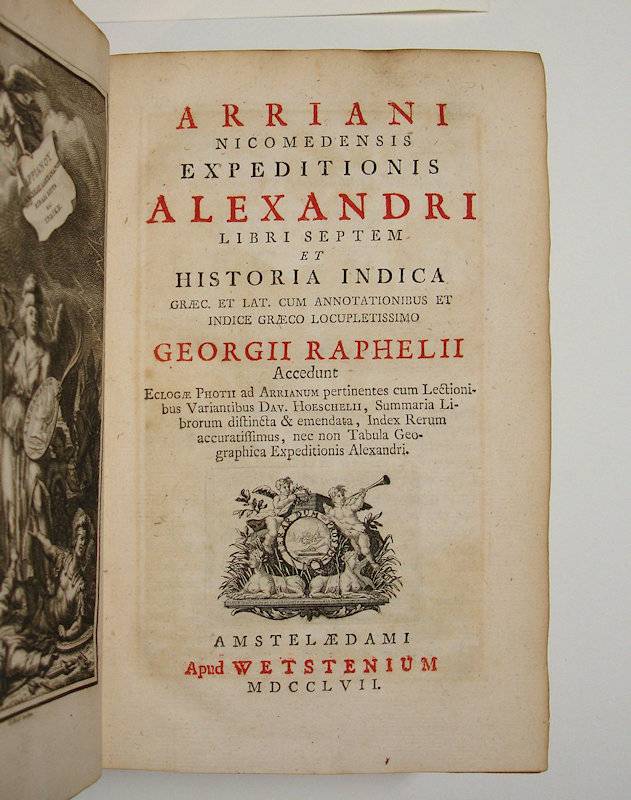ARRIANUS.
Arriani Nicomedensis Expeditionis Alexandri libri septem, et Historia Indica graec. et lat. cum annotationibus et indice graeco locupletissimo Georgii Raphelii. Accedunt Eclogae Photii ad Arrianum pertinentes cum lectionibus variantibus Dav. Hoeschelii, summaria librorum distincta & emendata, index rerum accuratissimus, nec non tabula geographica Expeditionis Alexandri.
Amsterdam (Amstelaedami), Apud Wetstenium, 1757.
8vo. XLVIII,637,(211) p., frontispiece, folding map of Europe and the Orient. Vellum 21 cm (
Ref: STCN ppn 212310364; Hoffmann 1,377; Brunet 1,497; Dibdin 1,329: 'An excellent and commodious edition'; Moss 1,188; Graesse 1,227; Ebert 1236) (
Details: 6 thongs laced through the joints. Frontispiece by I.K. Philips (in Greek letters), depicting an armed and winged Nike crushing 3 ennemies, a black African, an Asian and a European; in the air flies Fama with her trumpet. Title in red & black. Printer's mark on the title, depicting a hand sharpening a chisel on a whetstone, the motto is: 'Terar dum prosim'. The map is executed by N. Frankendaal. The text is printed in 2 columns, Greek and Latin side by side) (
Condition: Vellum slightly soiled and wrinkled at the top of the spine. Paper clipping on Nicomedia from 'The Gentleman's Magazine' (Vol. 98, 1828, Supplement part 1, p. 627) tipped in on front pastedown. Old & legible ink annotations on the front flyleaf. Rear endpapers stained, and its pastedown is detached. Paper yellowing) (
Note: This edition of Arrianus is more or less a 'parergon' of the German Lutheran theologian Georg Raphel, latinized as Georgius Raphelius, 1673 - 1740. He was 'Pfarrer' and Superintendent of the St. Nicolai church, and Inspector of the 'Scholae Johannaeae' at Luneburg. His interest in pagan antiquity and in the New Testament generated a series of works in which he compared the language and style of the New Testament with works of ancient historians. In 1709 he published in Hamburg, 'Annotationes Philologicae in N.T. ex Xenophonte collectae'. In 1715 appeared, also in Hamburg, 'Annotationes Philologicae in N.T. ex Polybio & Arriano collectae'. He published in Lüneburg in 1731 'Annotationes in S. Scripturam ex Herodoto collectae'. In 1710 Raphel had published a German translation of the Indica of Arrian, 'Arriani Indica, d.i. Indianische Geschichte oder Reisebeschreibung der Flotte Alexanders des Grossen, aus dem Griechischen ins Deutsche Übersetzt'. The three 'Annotationes Philologicae' were reprinted together in Leiden in 1747. This edition contains an extensive biography of Raphel, with at the end a list of his published works, and a short list of not yet published work: 'Scripta Rapheliana in MSC. adhuc latentia'. One of these 'scripta latentia' is 'Annotationes in Arrianum'. In the preface (Lectori) to our edition of Arrianus of 1757 the publisher Wetstein tells us that this manuscript with notes on Arrianus had lain tucked away ever since 1709 in a drawer ('in privatis scriniis'). (p. X) It had been offered in the meantime to German publishers, who however feared that they would not make a penny from it. Wetstein tells us that finally the son-in-law of Raphel, one Conr. Arn. Schmid (whom Ebert erroneously considers to be the editor), asked him to publish this work of his beloved and admired father-in-law. Raphel not only produced the annotations, but had made also a careful recension of the Greek text, especially with the help the new edition of the Leiden professor of Greek Jacobus Gronovius, who had discovered a new important manuscript of Arrian. ('textum quam potuit accuratissime castigavit, adjutus praesertim libris MSS a Jac. Gronovio consultis'. Preface p. VIII). The manuscript of Raphel contained also a corrected Latin translation. ('versionemque permultis locis pravam elegantissime correxit'. (Idem, ibidem) Wetstein probably here refers to the Latin translation of Bonventura Vulcanius which was printed in the 1704 edition of Gronovius. Wetstein ends with the assurance that all lovers of literature will thank the son-in-law for his troubles.
§ Raphel is also known for this pioneering work on deaf-muteness. Three of his children were deaf and dumb. 'Paternal affection had inspired him with zeal and skill in their instruction, and in 1718 he published, for the benefit of others, the result of his labours', 'Die Kunst Taube und Stumme reden zu lehren, am Exempel seiner eigenen Tochter'. It is said that his eldest daughter spoke so well that her deficiency was hardly noticed. The girl died however 20 years old) (
Provenance: On the front flyleaf at the head of the manuscript notes the name 'Mitford', and 'White') (
Collation: *-3*8; A-2S8, 2T-3Q4, 3R8, 3S4) (Photographs on request)
Book number: 130117 Euro 350.00
Keywords: (Oude Druk), (Rare Books), Alexander Magnus, Alexander der Grosse, Alexander the Great, Arrian, Binding, Greek history, Greek literature, Griechische Literatur, India, Latin translation, griechische Geschichte
 ARRIANUS.
ARRIANUS.